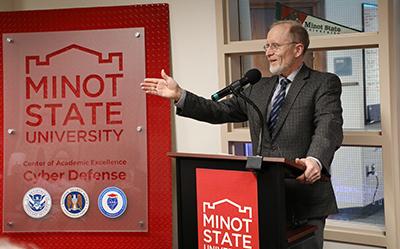Minot State earns National Center of Academic Excellence in Cyber Defense designation

MINOT, N.D. – Minot State University is proud to announce the Management Information Systems (MIS) program of study has been designated by the National Security Agency (NSA) and the Department of Homeland Security (DHS) as a Center of Academic Excellence in Cyber Defense (CAE-CD) through 2027.
The Cyber Defense designation is awarded to regionally accredited academic institutions offering cybersecurity degrees and/or certificates at the associate, bachelor, and graduate level. The designation process is a combination of elements related to the institution, focused on outputs for determining academic achievement. This combination assures that the institution meets the desired characteristics of a CAE-CD institution, and that the academic delivery to students is producing the qualified workforce needed by the nation.
“Earning the designation as a Center of Academic Excellence in Cyber Defense by the NSA and DHS is a significant honor for MSU, and specifically our College of Business. This designation is a strong seal of approval from the federal government regarding our cyber programming, and it will create wonderful new opportunities for current and future MSU students. Faculty have made major strides in both our business information technology (BIT) and computer science academic areas, and this academic excellence acknowledgment is yet another important affirmation of our expertise in these critical cyber areas,” said Minot State President Dr. Steven Shirley.
With this designation, Minot State is formally recognized by the U.S. government for its robust cybersecurity-related programs, having undergone in-depth assessment and met rigorous requirements.

“MSU’s bachelor’s in management information systems has been given CAE-CD designation under approval from the NSA and DHS,” said Chad Fenner, MSU assistant professor in BIT. “This happens after a deep review of the school’s academic program. Information Assurance (IA) prevents unauthorized access to sensitive information or classified information and systems. IA prevents others from stealing and tampering with our national security systems and information and protects the confidentiality, authenticity, and availability of data. Essentially, IA is cybersecurity.
“Federal partners include the Cybersecurity and Infrastructure Security Agency (CISA), the Federal Bureau of Investigation (FBI), the National Institute of Standards and Technology (NIST)/National Initiative on Cybersecurity Education (NICE), the National Science Foundation (NSF), the Department of Defense Office of the Chief Information Officer (DoD-CIO), and U.S. Cyber Command (USCYBERCOM).”
The extensive process included MSU’s ability to meet the following criteria:
- Establishes standards for cybersecurity curriculum and academic excellence,
- Includes competency development among students and faculty,
- Values community outreach and leadership in professional development,
- Integrates cybersecurity practice within the institution across academic disciplines,
- Actively engages in solutions to challenges facing cybersecurity education.

Fenner was instrumental in MSU earning the designation and is excited for the opportunities this affords Minot State students in the future.
“The designation opens opportunities for additional scholarships, internships, and government programs that allow students to get funding for school in exchange for working for government entities after graduation,” he said. “Students are also able to compete in CAE sponsored activities such as conferences, job fairs, research, and cybersecurity competitions at different levels. The designation shows future employees that students have earned a degree that is validated by the NSA and DHS ensuring graduates have the required skills and knowledge to work in government positions as well as private industry.”
Minot State becomes the first four-year institution in the North Dakota University System to earn the Cyber Defense designation and just the third four-year university in North Dakota, South Dakota, Montana, and Wyoming. MSU has furthered its cybersecurity offerings in recent years, adding a full degree in its computer science department along with an evolving cyber defense certificate in BIT and MIS. MSU has also added a robust technology club within the College of Business called Students With Interest in Future Technologies (SWIFT).

“Minot State over the last few years has made considerable progress in the cybersecurity offerings available to students,” Fenner said. “The computer science department has expanded its offering of degrees to include a cybersecurity cyber operations degree. This degree is one of the best technical cybersecurity programs in the country and will be designated as one in the near future.
“In addition, SWIFT creates its own special interest groups within these groups. Students participate in cybersecurity competitions but also are able to explore other aspects of technology. The club is open to all majors due to the idea of exploration of technology and how it can be advantageous to different individuals or industries.”
The NSA launched the Centers for Academic Excellence in Information Assurance Education (CAE-IAE) program in 1999 and seven schools became designated as a CAE-IAE by May 1999. While the CAE-IAE program initially formed to address the shortage of intelligence community professionals, the program later expanded to address the lack of qualified cybersecurity professionals in the workforce. Today, the NCAE-C program has over 300 institutions all over the nation with designations in Cyber Defense (CAE-CD), Cyber Research (CAE-R), and Cyber Operations (CAE-CO).
About Minot State University
Minot State University is a public university dedicated to excellence in education, scholarship, and community engagement achieved through
rigorous academic experiences, active learning environments, commitment to public service, and a vibrant campus life.
Published: 04/20/22




